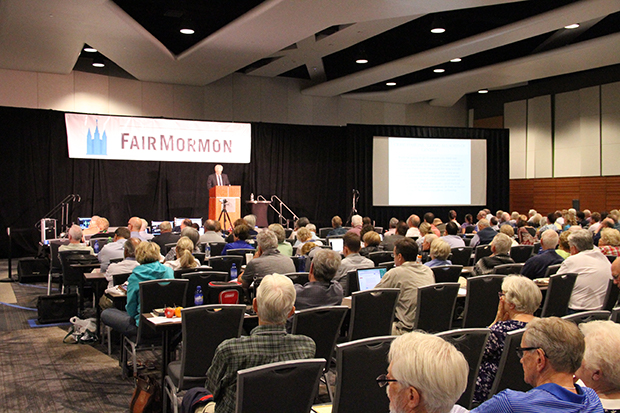Scholar Discusses Conflict between Gospel and Secular Ideas about Love and Charity
Contributed By R. Scott Lloyd, Church News staff writer

Ralph G. Hancock addresses the audience at the FairMormon Conference on the tension between gospel and secular conceptions of love on August 5, 2016.
Article Highlights
- Ralph C. Hancock scrutinized the moral interpretations of current popular slogans such as “Love Wins.”
“We need to understand what is at stake in this conception of love in order to be clear about what we are discussing, not only regarding the marriage question, but wherever fundamental moral and religious principles are a matter of concern.” —Ralph C. Hancock, professor of political science at Brigham Young University
Related Links
Sentiments expressed in such socially popular slogans as “Love Wins,” “Love Has No Labels,” and “All You Need Is Love” were scrutinized in an August 9 FairMormon Conference address by Ralph C. Hancock, professor of political science at Brigham Young University.
“Like others, I am concerned with addressing certain legitimate frustrations that many, especially many younger people, have with the Church, but my view is that some of these frustrations are based upon moral interpretations … which are both historically and philosophically very questionable,” said Brother Hancock, who is president of the independent John Adams Center for the Study of Faith, Philosophy, and Public Affairs.
Such slogans as the above, he remarked, are meant to convey the idea that “if you are not against love, … then you cannot oppose the indefinite expansion of rights protecting sexual expression and affirming a diversity of lifestyles. And who can be against love?”
Brother Hancock challenged the view that such a notion “is a legitimate descendant of the biblical teaching ‘charity never faileth’ (1 Corinthians 13:8).”
“We need to understand what is at stake in this conception of love in order to be clear about what we are discussing, not only regarding the marriage question, but wherever fundamental moral and religious principles are a matter of concern,” he added.
He identified as a central problem that “the confusing relationship between Christian charity and secular love is the tension between substance and universalism.”
To illustrate, he recounted a recent conversation he had “with an earnest and faithful young LDS scholar about the intersection between the Church and the secular world.”

Ralph G. Hancock addresses the audience at the FairMormon Conference on the tension between gospel and secular conceptions of love August 5, 2016. Photo by R. Scott Lloyd.
“I began, as I am wont to do, to make the simple orthodox case for the importance of declaring a clear, moral standard and a family ideal in a relativistic world,” he said. “This young man’s heartfelt reply was, ‘Don’t you want the Church to be available to the widest possible group, even to all of humanity? Does it not hinder the universal mission of the Church to insist on barriers?’”
In another incident Brother Hancock related, a young and faithful Church member was emphasizing the importance of compassion toward those who struggle with Church teachings on sexual morality. Someone asked him if sharing the principle of repentance would be an important expression of love.
“‘No, no,’ the young man replied. ‘If anyone needs repentance, it’s not the person struggling with sexual morality. The one needing repentance would only be the person who would presume to appeal to a principle higher than the feelings of the person who is struggling.’
“So these are two very powerful notions today: universalism, or inclusiveness, and compassion. Both of these thoughtful and faithful Latter-day Saints were effectively, it seems to me, falling in love with the ‘love wins’ mentality, not, I think, for any particular enthusiasm for sexual liberation or revolution in family structure, but according to the logic of universalism, inclusiveness, which indeed seems to be a defining gesture of the gospel, and especially of Paul’s letters.”
However, he added, “universalism is, by itself, empty and meaningless. There must be some content, some substance to be universalized, something to be shared. If you want to share, you have to have something to share. Every outreach presupposes an affirmation, every extension a center, every movement of compassion some understanding of the good, of what it would mean to heal and be whole.”
FairMormon Conference
The annual FairMormon Conference convened at the Utah Valley Convention Center in Provo August 4–5 with addresses from 15 presenters.
FairMormon is an organization of volunteers dedicated to “standing as a witness of Christ and His restored Church,” according to its mission statement, though the group is not formally affiliated with the Church.
“Our mission is to address the charges leveled at the doctrines, practices, and leaders of [the Church] with documented responses that are written in an easily understandable style.
“FairMormon will use current scholarship, scripture, Church doctrine, historical literature, and sound logic in constructing faithful, well-reasoned answers.”
